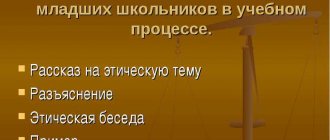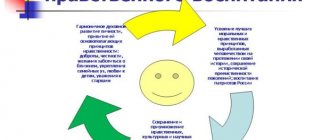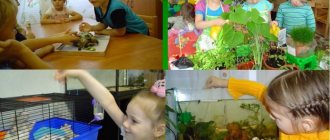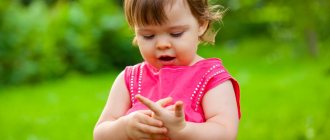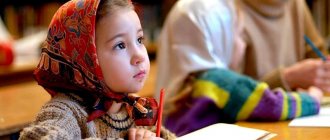The concept and content of spiritual and moral education
Definition 1
Spiritual and moral education is a purposefully organized pedagogical process of assimilation and acceptance by students of cultural, spiritual and moral values.
The essence of spiritual and moral education lies in the consistent expansion and strengthening of the value sphere of the child’s personality, the formation of his ability to find, see, perceive and evaluate beauty on the basis of cultural and moral norms and traditions.
Main directions of spiritual and moral education:
- Fostering love for the Motherland, developing patriotism, respect for the rights and freedom of every person.
- Education of aesthetic consciousness and moral feelings.
- Fostering hard work, a positive attitude towards work, learning and life.
- Formation and development of a value-based attitude towards a healthy lifestyle, one’s health, love and respect for family, nurturing family values.
- Fostering a respectful and valuable attitude towards the surrounding world, nature, and native land.
- Cultivating a value-based attitude towards aesthetically beautiful things, forming ideas about ideals and values.
Are you an expert in this subject area? We invite you to become the author of the Directory Working Conditions
Principles of spiritual and moral education:
- the principle of personal moral example;
- the principle of socio-pedagogical partnership between all participants in the educational process;
- the principle of individuality in education;
- the principle of integration of educational programs;
- the principle of relevance and relevance of education.
The role of the school and the teacher’s personality in spiritual and moral education
Today's children are very different from schoolchildren who were even 10 years ago. They are more knowledgeable, self-confident, more often inclined to overestimate their awareness, neglect authorities and other people's opinions, they are characterized by superficial feelings and reluctance to think. Very often, nationality and citizenship mean little for primary school students; the importance of school life and education also lose importance. Literary heroes, famous compatriots, and teachers cease to be moral models.
Thoughts about a future profession have little to do with selfless service to others, life orientations are mercantile, children’s consciousness is directed towards personal interests, singers, football players, bankers, and action movie heroes become their idols.
Properly organized school life actively counters the examples of immoral and destructive behavior that capture children's consciousness through computer games and television shows.
Within the walls of the school, a cultural space is modeled where traditional moral principles are an absolute priority. But the values of high culture are perceived by the child only through his own activities.
?
A lesson is not something individual, but a place of collective experiences and actions, where children accumulate moral experience, they learn to work independently, listen, compare, defend opinions, and help others.
For younger schoolchildren, the teacher is in many ways a role model in manners and attitude towards children. If warmth and responsiveness reign in the class, and the teacher cares about his students, then the relationships between classmates become the same. Elders, as in the family, should pay attention not only to children’s success in reading and mathematics, but also to their spiritual and moral development; upbringing and the learning process in primary school are inextricably linked .
Means of moral education
I. The purpose and objectives of the spiritual and moral development and education of students.
The goal of spiritual and moral development and education of students at the level of primary general education is social and pedagogical support for the formation of personal characteristics of a primary school graduate, namely:
— able to learn, able to organize his activities, able to use information sources;
— having experience in motivated participation in competitions and projects at the regional and international levels;
— possesses the basics of communicative culture (knows how to listen and hear the interlocutor, express his opinion);
— inquisitive, interested, actively exploring the world;
— loving his family, his land and his homeland;
— respects and accepts the values of society;
— ready to act independently and be responsible for his actions to his family and school;
— following the rules of a healthy and safe lifestyle for himself and others.
The general objectives of the spiritual and moral development and education of students at the level of primary general education are determined on the basis of the national educational ideal given in the Concept, as well as taking into account the “Requirements for the results of mastering the basic educational program of primary general education” established by the Standard:
| In the field of personal culture formation | In the field of formation of social culture | In the field of formation of family culture |
| — realization of creative potential in all types of activities; — formation of the foundations of a person’s moral self-awareness (conscience); — the ability of a primary school student to formulate his own moral obligations, exercise moral self-control, demand that he fulfill moral standards, and give a moral assessment of his own and others’ actions; — student acceptance of basic national values; national and ethnic spiritual traditions; — formation of aesthetic needs, values and feelings; — developing the ability to openly express and defend one’s morally justified position; — development of hard work, the ability to overcome difficulties, determination and perseverance in achieving results. | — formation of the foundations of Russian civic identity; — formation of patriotism and civil solidarity; — formation of tolerance and the foundations of a culture of interethnic communication, respect for the language, cultural, religious traditions, history and way of life of representatives of the peoples of Russia; — development of skills in organizing and implementing cooperation with teachers, peers, parents, and older children in solving common problems; — development of goodwill and emotional responsiveness; — the formation of humanistic and democratic value orientations. | — formation in the student of a respectful attitude towards parents, a conscious, caring attitude towards elders and younger ones; — formation of ideas about family values; — acquaintance of the student with the cultural, historical and ethnic traditions of the Russian family. |
III. Contents of spiritual and moral development and education of students
The implementation of the program involves the creation of a socially open space in which these values will be realized in practical life:
- in the content and construction of lessons;
- in the ways of organizing joint activities of adults and children in educational and extracurricular activities, in the nature of communication and cooperation between adults and children;
— in the experience of organizing individual, group, and collective activities of students;
- in special events designed with a specific value and meaning in mind;
- as a personal example to students.
The experience of implementing the Community-Active School Development Program will make it possible to use the already created space. The concerted efforts of all social actors participating in education ensure its full functioning, i.e. socially open way of school life. The way of school life is a pedagogically appropriate form of bringing into compliance various types (educational, family, socially useful, labor, aesthetic, socio-communicative, creative, etc.) and levels (classroom, extracurricular, extracurricular, family, socially useful) activities of a child with moral standards, ethical guidelines, national spiritual traditions.
The main principles of maintaining a socially active school (according to the Development Program) take into account the multi-subjectivity of modern education and socialization of the student. Therefore, the accumulated experience allows us to create a way of life for the student that is organized by the teaching staff of the school with the active and coordinated participation of other subjects of education and socialization.
The socially open space of the moral lifestyle of students is carried out on the basis of the following principles:
The principle of integrativeness.
Integration of spiritual and moral development and education into the main activities of students: classroom, extracurricular, extracurricular and socially useful.
Target programs
The school implements a number of targeted programs that are aimed at developing a democratic culture among schoolchildren as the basis for the development of civil society through the implementation of democratic principles in all aspects of school life. These programs contribute to the formation and development of key competencies.
| № | Program | Summary | Direction |
| "Galaxy of Kind Hearts" | Program objectives: formation of an active civic position; acquisition by students of legal, political and economic culture skills; familiarity with the basic democratic processes of modern civil society; ability to adapt to the changing conditions of modern society; identifying assets among students and developing self-government at school. The meaning of student self-government is to teach all children the basics of democratic relations in society, to teach them to manage themselves, their lives in a team. | Education of citizenship, respect for human rights, freedoms and responsibilities. | |
| "Patriotic education program" | The objectives of this program: - carrying out reasonable organizational activities to create conditions for effective patriotic education of schoolchildren; — formation of an effective system of patriotic education that provides optimal conditions for the development of each teenager’s loyalty to the Fatherland and readiness to benefit society and the state; — affirmation in the minds and feelings of pupils of patriotic values, views and beliefs, instilling respect for the cultural and historical past of Russia, for the traditions of their native land; — physical development of students, formation of their need for a healthy lifestyle; — involving students in the work of reviving and preserving the cultural and spiritual and moral values of their native land; — methodological support for the functioning of the system of patriotic education. The program is designed for the period from 2012 to 2015. | Raising a Russian patriot with his inherent values, views, orientations, attitudes, motives for activity and behavior. | |
| 3. | "Journey to the Sunny City" | This program is aimed at: - Formation of valuable qualities and habits of behavior, such as the desire to tell the truth, act fairly, be precise: said-did, promised-fulfilled. — Formation of skills of organization, diligence, politeness, respect for elders, intolerance to laziness, arrogance, rudeness and lies. — Fostering a love of reading, nature, and the native land. — Fostering awareness of one’s community with the team, the spirit of camaraderie and cooperation, the desire to help each other. — Development of cognitive interest of students. The program is attended by students in grades 1-4, teachers, trainee counselors and parents. The program is designed for 4 years and is implemented in four directions (paths). | Development of a creative personality, introducing children to vital knowledge. |
Applications
List of statements
1. The guys try to do things well that are useful to the whole school.
2. When we get together, we always talk about the general affairs of the class.
3. It is important to us that everyone in the class can express their opinion.
4. We do better if we do something together, rather than individually.
5. After lessons we are in no hurry to leave and continue to communicate with each other.
6. We participate in something if we expect a reward or success.
7. The class teacher is interested in us.
8. If the class teacher suggests us what to do, he takes our opinions into account.
9. The class teacher strives to ensure that everyone in the class understands why we are doing this or that.
10. The guys in our class always behave well.
11. We agree to difficult work if the school needs it.
12. We make sure that our class is the friendliest in the school.
13. The leader of the class can be the one who expresses the opinions of other children.
14. If the matter is interesting, then the whole class actively participates in it.
15. In the general affairs of the class, what we like most is helping each other.
16. It’s easier to get us involved in a business if you prove its benefits for everyone.
17. Things go much better when the class teacher is with us.
18. In case of difficulties, we freely turn to the class teacher.
19. If things fail, the class teacher shares responsibility with us.
20. In our class, the guys are always right in everything.
Development
Methodology “Story Pictures” (intended for children in grades 1-2)
(according to R.R. Kalinina)
The child is provided with pictures depicting positive and negative actions of peers. The child must arrange the pictures so that on one side there are those with good deeds on them, and on the other - bad ones, explaining his choice.
Processing the results.
0 points – the child arranges the pictures incorrectly (in one pile there are pictures depicting bad and good deeds), emotional reactions are inadequate or absent.
1 point – the child arranges the pictures correctly, but cannot justify his actions; emotional reactions are inadequate.
2 points – the child correctly arranges the pictures, justifies his actions, emotional reactions are adequate, but weakly expressed.
3 points – the child justifies his choice (names moral standards); emotional reactions are adequate, bright, manifested in facial expressions, active gestures, etc.
“Finish the story” technique
The technique is intended to study children's awareness of moral standards. The research is carried out individually.
Test instructions : “I will tell you stories, and you finish them.”
Test material
History 1 . The children built the city. Olya stood and watched others play. The teacher approached the children and said: “We are going to have dinner now. It's time to put the cubes into boxes. Ask Olya to help you." Then Olya answered...
What did Olya answer? Why? What did she do? Why?
History 2 . For Katya's birthday, her mother gave her a beautiful doll. Katya began to play with her. Then her younger sister Vera came up to her and said: “I also want to play with this doll.” Then Katya answered...
What did Katya answer? Why? What did Katya do? Why?
History 3 . Lyuba and Sasha were drawing. Lyuba drew with a red pencil, and Sasha with a green one. Suddenly Lyubin's pencil broke. “Sasha,” said Lyuba, “can I finish the picture with your pencil?” Sasha replied...
What did Sasha answer? Why? What did Sasha do? Why?
History 4 . Petya and Vova were playing together and broke an expensive beautiful toy. Dad came and asked: “Who broke the toy?” Then Petya answered... What did Petya answer? Why? What did Petya do? Why? All the child’s answers, if possible verbatim, are recorded in the protocol.
Processing test results
– 0 points – the child cannot evaluate the children’s actions.
– 1 point – the child evaluates children’s behavior as positive or negative (right or wrong, good or bad), but does not motivate the assessment and does not formulate a moral standard.
– 2 points – the child names a moral standard, correctly assesses the behavior of children, but does not motivate his assessment.
— 3 points – the child names a moral standard, correctly evaluates children’s behavior and motivates his assessment.
Methodology “How to act”
(intended to identify attitudes towards moral standards).
The child is asked to imagine a given situation and report how he would behave in it. For example, the first situation
: During recess, one of your classmates broke a window.
Did you see that. He didn't confess. What are you going to say? Why? Second situation
: classmates conspired to disrupt the lesson. What will you do? Why?
Processing of results according to the above scale.
PROGRAM
SPIRITUAL AND MORAL DEVELOPMENT AND EDUCATION OF STUDENTS AT THE LEVEL OF PRIMARY GENERAL EDUCATION
Explanatory note
The regulatory, legal and documentary basis of the Program for the spiritual and moral development of students at the level of primary general education is the Law “On Education”, the federal state educational standard for primary general education, the Concept of spiritual and moral education of Russian schoolchildren, the Concept of the educational complex “School of Russia” and the experience of implementing the Program school development.
The program of spiritual and moral education and development of students is aimed at educating every student as a citizen and patriot, at revealing the abilities and talents of students, and preparing them for life in a high-tech competitive world.
This program allows you to build the overall activities of the school, which is implemented in three areas: in the learning process (lesson activities) - in extracurricular activities (extracurricular activities) - and in extracurricular activities (extracurricular activities).
The purpose of the program: to create social and pedagogical conditions for the upbringing, development and personality formation of a junior school student who is able to consciously build an attitude towards himself, his family, society, the state, the Fatherland, and the world as a whole on the basis of accepted moral norms and moral ideals.
Tasks:
— Formation of the ability for continuous education, self-education and universal spiritual and moral competence - “becoming better.”
— Creating a school-wide atmosphere of love, mutual understanding and mutual assistance.
— Development of active cultural consciousness and moral behavior of children.
— Formation of a personality that respects the history of its people, capable of tolerant interaction with the surrounding reality.
— Orienting the family towards the spiritual and moral education of children, strengthening the authority of the family.
The program is implemented by the school in constant interaction and close cooperation with the families of students, with other subjects of socialization - the social partners of the school:
— institutions of additional education (TsViDO, Youth Sports School);
— district Veterans Council;
— Committee on Youth Affairs;
— society of families with children with disabilities “Nadezhda”;
— public organization of women “Bereginya”;
— cultural institutions (libraries, museum and exhibition center, Komi Izba);
- Media (district newspaper “Northern Panorama”, school newspaper “Stupeni”, TV studio “Chum-TV”
The program of spiritual and moral development and education of students contains six sections.
1. The purpose and objectives of spiritual and moral development, education of students and value systems of spiritual and moral development and education of Russian schoolchildren.
2. The main directions of spiritual and moral development of primary school students.
3. Content of spiritual and moral development of primary school students.
4. Joint activities of the school, family and community for the spiritual and moral development of students.
5. Planned results of students’ spiritual and moral development
6. Criteria for the effectiveness of the functioning of the Program for the spiritual and moral development and education of junior schoolchildren.
Basic concepts:
Socialization is a person’s assimilation of social experience in the process of education and life through entering the social environment, establishing social connections, accepting the values of various social groups and society as a whole, and actively reproducing the system of social relations.
Spiritual and moral education is a pedagogically organized process of assimilation and acceptance by students of basic national values, mastering the system of universal human values and cultural, spiritual and moral values of the multinational people of the Russian Federation.
Spiritual and moral development is the consistent expansion and strengthening of the value-semantic sphere of the individual, carried out in the process of socialization, the formation of a person’s ability to evaluate and consciously build, on the basis of traditional moral norms and moral ideals, attitudes towards oneself, other people, society, the state, the Fatherland, the world as a whole. .
I. The purpose and objectives of the spiritual and moral development and education of students.
The goals and objectives of the spiritual and moral development and upbringing of the personality of a junior schoolchild are formulated, achieved and solved in the context of the national educational ideal. On its basis, the Federal State Educational Standard for Primary General Education substantiates the “portrait of a primary school graduate” and formulates the main goal of the moral development and personality education of a junior schoolchild.
The goal of spiritual and moral development and education of students at the level of primary general education is social and pedagogical support for the formation of personal characteristics of a primary school graduate, namely:
— able to learn, able to organize his activities, able to use information sources;
— having experience in motivated participation in competitions and projects at the regional and international levels;
— possesses the basics of communicative culture (knows how to listen and hear the interlocutor, express his opinion);
— inquisitive, interested, actively exploring the world;
— loving his family, his land and his homeland;
— respects and accepts the values of society;
— ready to act independently and be responsible for his actions to his family and school;
— following the rules of a healthy and safe lifestyle for himself and others.
The general objectives of the spiritual and moral development and education of students at the level of primary general education are determined on the basis of the national educational ideal given in the Concept, as well as taking into account the “Requirements for the results of mastering the basic educational program of primary general education” established by the Standard:
1Next ⇒
Recommended pages:

